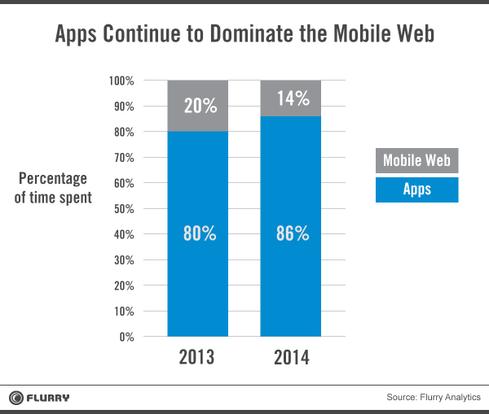The web might be the dominant platform of our time, but more people than ever prefer to experience it through Google and iOS mobile apps.


7 Facebook Wishes For 2014
7 Facebook Wishes For 2014 (Click image for larger view and slideshow.)
Six years into the mobile revolution, apps dominate the web. It wasn't supposed to be that way.
The web was supposed win. It was supposed to be a platform for everyone, open and unencumbered by rules. And for a while it was winning: The web became the foundation of today's great consumer Internet businesses: Amazon, Facebook, and Google. It was even embraced by Apple and Microsoft, albeit cautiously.
But the web's victories have mattered mainly behind the scenes, on the back end, among servers and data centers. On the front end, in the web browser, the web's evolving technology for programming and presentation has been overshadowed in recent years by native apps, software written primarily in Java or Objective-C for Google's Android or Apple's iOS operating system rather than in open web technologies such as HTML, CSS, and JavaScript. It's a story that can be seen in the rise of Mozilla and its recent struggle for relevance.
[Breaking apps makes them stronger. Read Can You Deliver Antifragile Mobile Apps?]
Blame mobile devices, which accommodate the touch-based interaction of native apps more elegantly than web apps. The web evolved to accommodate the keyboard-and-mouse-based interaction of desktop computers before being retrofitted for mobile. And though mobile-oriented JavaScript frameworks have addressed these issues, the web's desktop legacy still gets in the way.
From January through March this year, according to online metrics firm Flurry, app usage accounted for 86% of the average US mobile consumer's time, a figure that works out to two hours and 19 minutes a day and represents an increase of six percentage points year-over-year. Time spent accessing the web from mobile devices during this period slipped to 14%, down from 20% during the same period last year.
"The data tells a clear story that apps, which were considered a mere fad a few years ago, are completely dominating mobile, and the browser has become a single application swimming in a sea of apps," said Simon Khalaf, CEO of Flurry, in a blog post.
The turning point, as measured by eMarketer, another metrics firm, came last August when time spent on mobile overtook time spent on laptops and PCs.
Consumers spent the largest portion of their time (32%) interacting with gaming apps, a percentage unchanged from last year. Social and communication apps, including Facebook, claimed 28% of users' time, up from 24% last year. Entertainment and utility apps maintained their 8% share of users' time while productivity apps saw usage double to reach 4% of overall time spent using mobile devices.
Looking at the mobile market, Khalaf sees opportunity, noting that Facebook and Google between them receive less than a quarter of the attention of US mobile consumers. He also points to ComScore figures indicating that the top 10 online franchises absorb less than 40% of consumer attention.
Khalaf observes that while Facebook's share of mobile advertising revenue matches up with time users spend on the network, Google's share of mobile advertising revenue is disproportionately high as measured against the time mobile users spend with Google apps.
Other apps are not receiving a share of mobile ad spending that's proportional to the time spent by users in those apps. These apps "command 65.3% of time spent but only receive 32% of ad revenues," said Khalaf. "This represents a massive opportunity for applications, including gaming apps, to monetize through advertising."
Yet the appeal of native apps over the mobile web is mainly about the superior user experience. As John Gruber put it last year on Daring Fireball, "Web apps are the best way to reach the most possible people with the least effort; native apps are the best way to create the best possible experience."
Now imagine the best possible experience with ads. Maybe the mobile web would be better received without them.
IT organizations must build credibility as they cut apps, because app sprawl is often due to unmet needs. Also in the App Consolidation issue of InformationWeek: To seize web and mobile opportunities, agile delivery is a given. (Free registration required.)
About the Author(s)
You May Also Like







